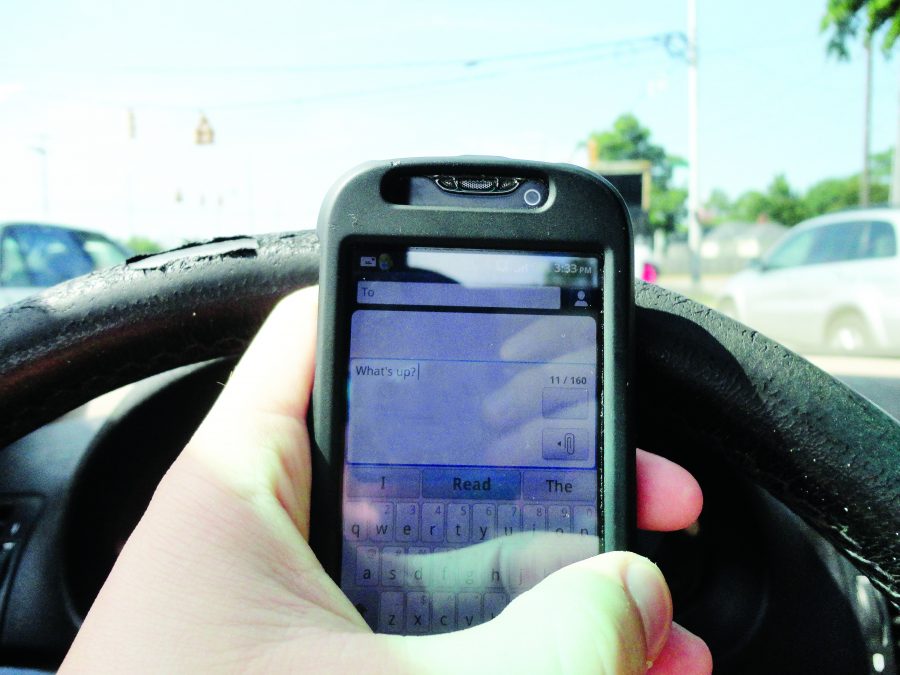The state of Alabama will attempt to eliminate a growing and highly dangerous threat to the safety of drivers and passengers on Alabama roadways starting August 1.
The new law will attempt to lessen accidents on the roadways caused by distracted driving through the ban of texting, emailing or instant messaging while on the road.
“Texting and driving is a very big issue that causes accidents, just as any other form of distracted driving,” Sgt. Brent Blankley, public information officer for the Tuscaloosa Police Department, said. “Any time you stop looking at the road you lose the ability to make a split second decision that might be needed to avoid an accident or hitting an object that might be in the road.”
A report by the Center for Advanced Public Safety at the University of Alabama states that, in the state of Alabama in 2010, 1,846 crashes out of an annual total of 128,384 were caused by a passenger or electronic device distracting the driver.
Nationwide, 3,092 people died in 2010 due to an accident involving a distracted driver, according to Distraction.gov, the official government website for distracted driving.
So, just how prevalent is the danger of texting while driving becoming for young people?
According to the 2011 Youth Risk Behavior Survey released by the Centers for Disease Control and Prevention on Thursday, June 7, 32.8 percent of students admitted to having texted while driving at least once in the previous month.
Texting or using a cellular device while driving was the most common form of dangerous driving among youth, with riding with a driver who had been drinking alcohol at 24.1 percent, participating in drinking and driving at 8.2 percent and rarely or never wearing a seatbelt at 7.7 percent.
“I have texted and driven at the same time,” said Rachel Childers, a sophomore studying psychology. “However, from what I have experienced, I have found it is very unsafe due to lack of focus on the road. I will be happy a law will be put in place to stop texting and driving because it not only endangers your life, but those around you.”
Sarah Blalock, a junior studying nursing, said she agrees.
“I’m glad it’s going to be illegal,” she said. “I think texting and driving is just as dangerous as drinking and driving.”
Blalock says some of her friends do text and drive.
“It makes me really nervous riding with them, especially when they think they’re ‘good texters,’ so [they think] it doesn’t matter if they do it,” she said.
Dr. Philip Gable, a UA psychology professor, blamed habit for making people text and drive despite the statistics offered by Distraction.gov and others.
“Habits are hard to resist,” he said. He also pointed out that once we’ve learned a habit, it’s hard to change.
However, Gov. Robert Bentley intends to make texting while driving a habit of the past. The law will include a $25 fine for the first offense, a $50 fine for the second offense and a $75 fine for every consecutive offense. Each will count as a two-point violation on driving records.
Texting or using a cellular device while driving was the most common form of dangerous driving among youth, with riding with a driver who had been drinking alcohol at 24.1 percent, participating in drinking and driving at 8.2 percent and rarely or never wearing a seatbelt at 7.7 percent.
“I have texted and driven at the same time,” Rachel Childers, a sophomore studying psychology, said. “However, from what I have experienced, I have found it is very unsafe due to lack of focus on the road. I will be happy a law will be put in place to stop texting and driving because it not only endangers your life, but those around you.”
Sarah Blalock, a junior studying nursing, said she agrees.
“I’m glad it’s going to be illegal,” she said. “I think texting and driving is just as dangerous as drinking and driving.”
Blalock says some of her friends do text and drive.
“It makes me really nervous riding with them, especially when they think they’re ‘good texters,’ so [they think] it doesn’t matter if they do it,” she said.
Dr. Philip Gable, a UA psychology professor, blamed habit for making people text and drive, despite the statistics offered by Distraction.gov and others.
“Habits are hard to resist,” he said. He also pointed out that once we’ve learned a habit, it’s hard to change.
However, Gov. Robert Bentley intends to make texting while driving a habit of the past. The law will include a $25 fine for the first offense, a $50 fine for the second offense and a $75 fine for every consecutive offense. Each will count as a two-point violation on driving records.







